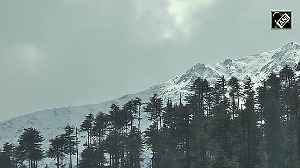
Invoking the age-old cultural bonds between India and Iran, Prime Minister Narendra Modi on Monday said it was time for the two countries to "march together" by regaining the "past glory" of historical ties which had witnessed its share of "ups and downs".
Addressing a conference on the traditional ties between India and Iran before winding up his two-day visit here, Modi spoke about how the cultures of the two countries were woven with each other over centuries.
He said the conference, aimed at highlighting sufism and other cultural linkages, was a "perfect response to those who preach radical thoughts in our societies" as he underlined that the ancient civilizations of the two countries have been inclusive and welcoming to foreign cultures.
"In the world of today, political pundits talk of strategic convergence. But, India and Iran are two civilizations that celebrate the meeting of our great cultures," Modi told a gathering of scholars at the conference 'India and Iran, Two Great Civilizations: Retrospect and Prospects'. On the occasion, he also released a rare Persian manuscript.
"India and Iran have always been partners and friends. Our historical ties may have seen their share of ups and downs. But, throughout our partnership has remained a source of boundless strength for both of us," he said.
Noting that the conference was most ideally timed as it was an occasion to "recall and renew our centuries-old association", the Prime Minister said, "Time has come for us to regain the past glory of traditional ties and links. Time has come for us to march together."
He said the conference fulfils a responsibility to familiarize the younger generations of the two countries with the beauty and riches of their cultural heritage.
The rare Persian manuscript Kalileh-wa-Dimneh, released by him, captures the close historical links between India and Iran. "It is remarkable how the simple stories of the Indian classics of Jataka and Panchatantra became the Persian Kalileh-wa-Dimneh," Modi said.
"It is a classic example of exchange and travel of cultural ideas between two societies a beautiful demonstration of how our two cultures and countries think alike. A true depiction of the wisdom of our ancient civilizations," the Prime Minister said.
"As two ancient civilizations, we (India and Iran) are known for our ability to be inclusive and welcoming to foreign cultures. Our contacts have not just refined our own cultures, they have also contributed to the growth of moderate and tolerant societies globally," Modi said.
"Sufism, a rich product of our ancient links, carried its message of true love, tolerance and acceptance to the entire mankind," he said, adding the spirit of Sufism is also reflected in the Indian concept of ‘Vasudhaiva Kutumbakam’, which means that the 'World is one family'.
While highlighting the bonds between India and Iran, the prime minister said, "Centuries of free exchange of ideas and traditions, poets and craftsmen, art and architecture, culture and commerce have enriched both our civilizations. Our heritage has also been a source of strength and economic growth for our nations."
He said the richness of Persian heritage is an integral part of the fabric of the Indian society. "A part of Iranian culture lives in Indian hearts. And, a slice of Indian heritage is woven into the Iranian society," he added.
Modi noted that the ancient heroes and epics of the two countries bear striking parallels. "The dargahs of Ajmer Sharif and Hazrat Nizamuddin in India are equally revered in Iran. Mahabharata and Shahnama, Bhima and Rustam, Arjuna and Arsh exhibit similarity in our world views and values," he said.
He said crafts like Zardozi, Guldozi and Chanderi may be a part of the Iranian society but they are equally common in India too.
"In the richness of Iranian culture, who can forget the poetry and beauty of its vehicle -- the Persian language. In India, we regard it as one of our own. The great medieval poets of India have called the Persian and Sanskrit the two sisters," Modi said, while noting that the Iranian language had served as a court language in medieval India.
He said India's religious epic Ramayana, which has seen over a dozen translations in Persian, is known to have about 250 words of Persian.
The popularity of Persian is also because it is "written on the hearts of the Indians", he said as he pointed out that the language is taught in around 40 universities in India and All India Radio has been running the Persian language service for last 75 years.
"India has a proud collection of almost 5 million manuscripts of Persian in public and private collections. There are more than 20 million documents in Persian in national and state archives.
"Many of these have common heritage as they were written by Iranian calligraphers and painted by Indian artists. In Salar Jung museum in Hyderabad, such a combination can be found in many manuscripts. A major effort to digitize all manuscripts, including Persian is currently underway in India," he said.










